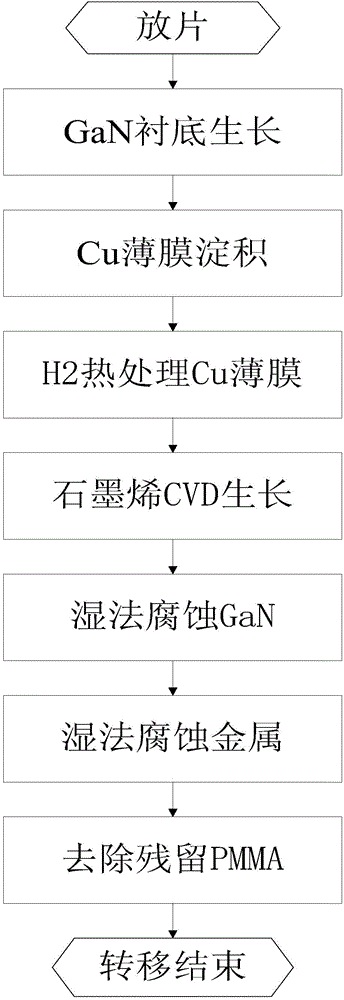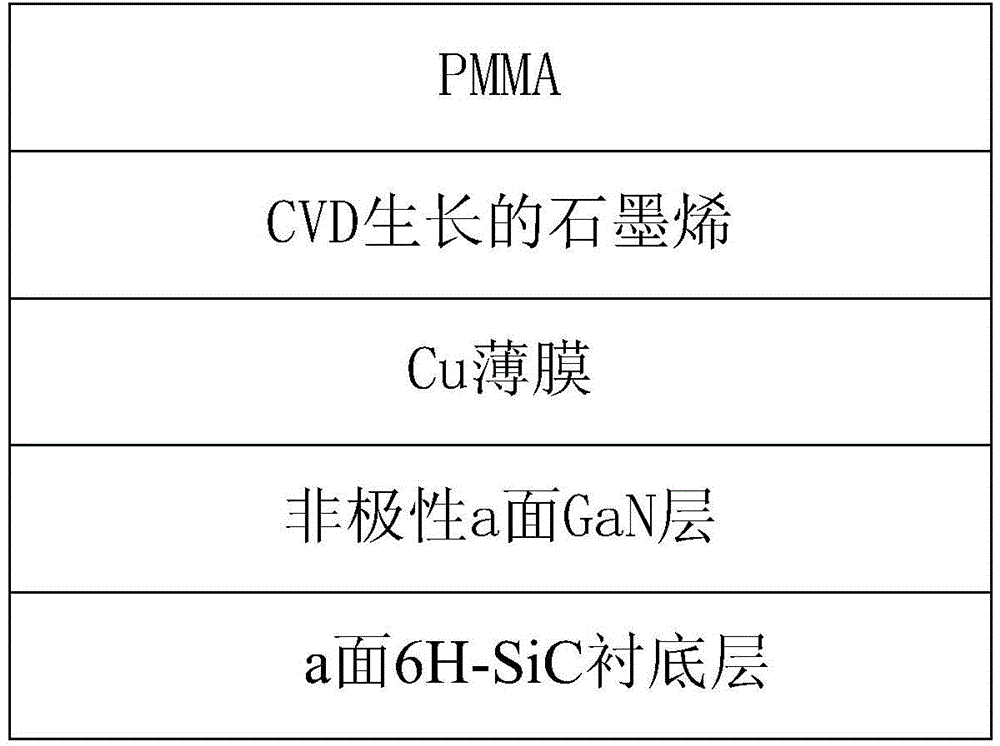Chemical corrosion transfer method based on GaN substrate CVD epitaxial growth graphene
A technology of epitaxial growth and transfer method, which is applied in the direction of chemical instruments and methods, single crystal growth, crystal growth, etc. It can solve problems such as deterioration of corrosion effect, degradation of graphene electrical properties, increase of corrosion time, etc., and achieve a reduction in corrosion temperature , avoid adverse effects, and reduce the effect of corrosion time
- Summary
- Abstract
- Description
- Claims
- Application Information
AI Technical Summary
Problems solved by technology
Method used
Image
Examples
Embodiment 1
[0025] Step 1, growing a GaN substrate.
[0026] Place the a-side silicon carbide 6H-SiC substrate in the metal organic chemical vapor deposition MOCVD reaction chamber, and pass the mixed gas of gallium source and ammonia gas into the reaction chamber, the flow rate of gallium source is 50 μmol / min, and the flow rate of ammonia gas is 1000 sccm , and continued for 1 hour to grow an a-plane GaN substrate with a thickness of 1 μm.
[0027] Step 2, Cu film deposition and annealing treatment.
[0028] Vacuumize the reaction chamber to ensure that the air pressure is not higher than 10 -6 Under the condition of Torr, a Cu film with a thickness of 1 μm was deposited on the GaN substrate by electron beam evaporation, and H2 with a flow rate of 1 sccm was introduced into the reaction chamber, and the temperature in the reaction chamber was raised to 900 ° C, and the deposited Cu film was thermally annealed. The annealing time is 20min.
[0029] Step 3, growing graphene.
[0030] ...
Embodiment 2
[0045] Step A, growing a GaN substrate.
[0046] Place the a-side silicon carbide 6H-SiC substrate in the metal organic chemical vapor deposition MOCVD reaction chamber, and feed the mixed gas of gallium source and ammonia gas into the reaction chamber. The flow rate of gallium source is 100 μmol / min, and the flow rate of ammonia gas is 2000 sccm , continued for 40 hours, and grew an a-plane GaN substrate with a thickness of 2 μm.
[0047] Step B, Cu film deposition and annealing treatment.
[0048] Vacuumize the reaction chamber to ensure that the air pressure is not higher than 10 -6 Under the condition of Torr, electron beam evaporation deposits a Cu film with a thickness of 2 μm on the GaN substrate, feeds H2 with a flow rate of 10 sccm into the reaction chamber, raises the temperature in the reaction chamber to 950 ° C, and performs thermal annealing on the deposited Cu film. The annealing time is 20min.
[0049] Step C, growing graphene.
[0050] It is 50sccm H that ...
Embodiment 3
[0065] Step 1, growing a GaN substrate.
[0066] Place the a-side silicon carbide 6H-SiC substrate in the metal organic chemical vapor deposition MOCVD reaction chamber, feed the mixed gas of gallium source and ammonia gas into the reaction chamber, the flow rate of gallium source is 150 μmol / min, and the flow rate of ammonia gas is 3000 sccm , continued for 0.5 hours, and grew an a-plane GaN substrate with a thickness of 1.5 μm.
[0067] Step 2, Cu film deposition and annealing treatment.
[0068] Vacuumize the reaction chamber to ensure that the air pressure is not higher than 10 -6 Under the condition of Torr, electron beam evaporation deposits a Cu film with a thickness of 3 μm on the GaN substrate, feeds H2 with a flow rate of 20 sccm into the reaction chamber, raises the temperature in the reaction chamber to 1000 ° C, and performs thermal annealing on the deposited Cu film. The annealing time is 60min.
[0069] Step three, grow graphene.
[0070] It is 100sccm H2 th...
PUM
 Login to View More
Login to View More Abstract
Description
Claims
Application Information
 Login to View More
Login to View More - R&D
- Intellectual Property
- Life Sciences
- Materials
- Tech Scout
- Unparalleled Data Quality
- Higher Quality Content
- 60% Fewer Hallucinations
Browse by: Latest US Patents, China's latest patents, Technical Efficacy Thesaurus, Application Domain, Technology Topic, Popular Technical Reports.
© 2025 PatSnap. All rights reserved.Legal|Privacy policy|Modern Slavery Act Transparency Statement|Sitemap|About US| Contact US: help@patsnap.com


